Charles E W Bean, Diaries, AWM38 3DRL 606/255/1 - 1916 - 1937 - Part 16
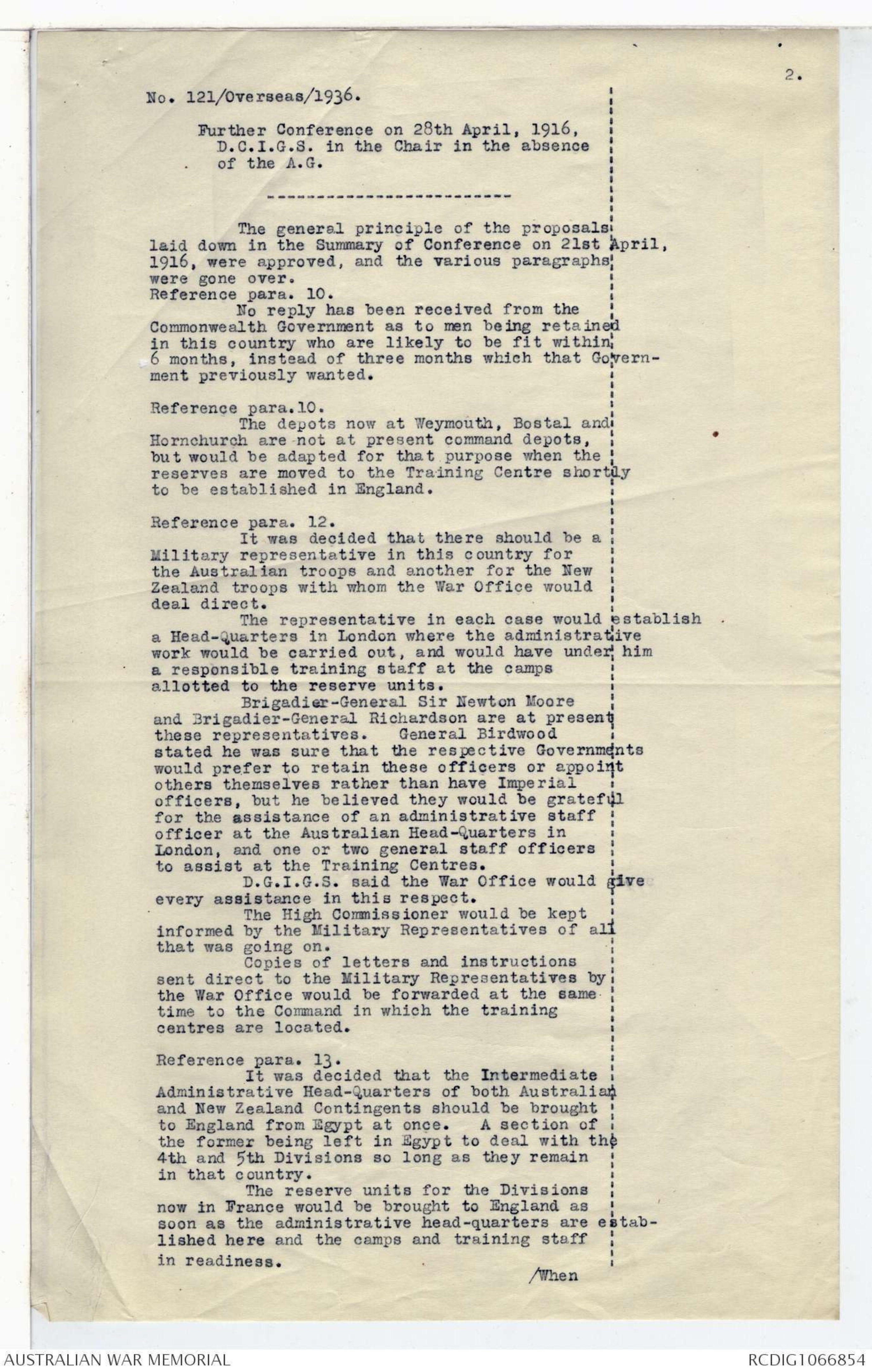
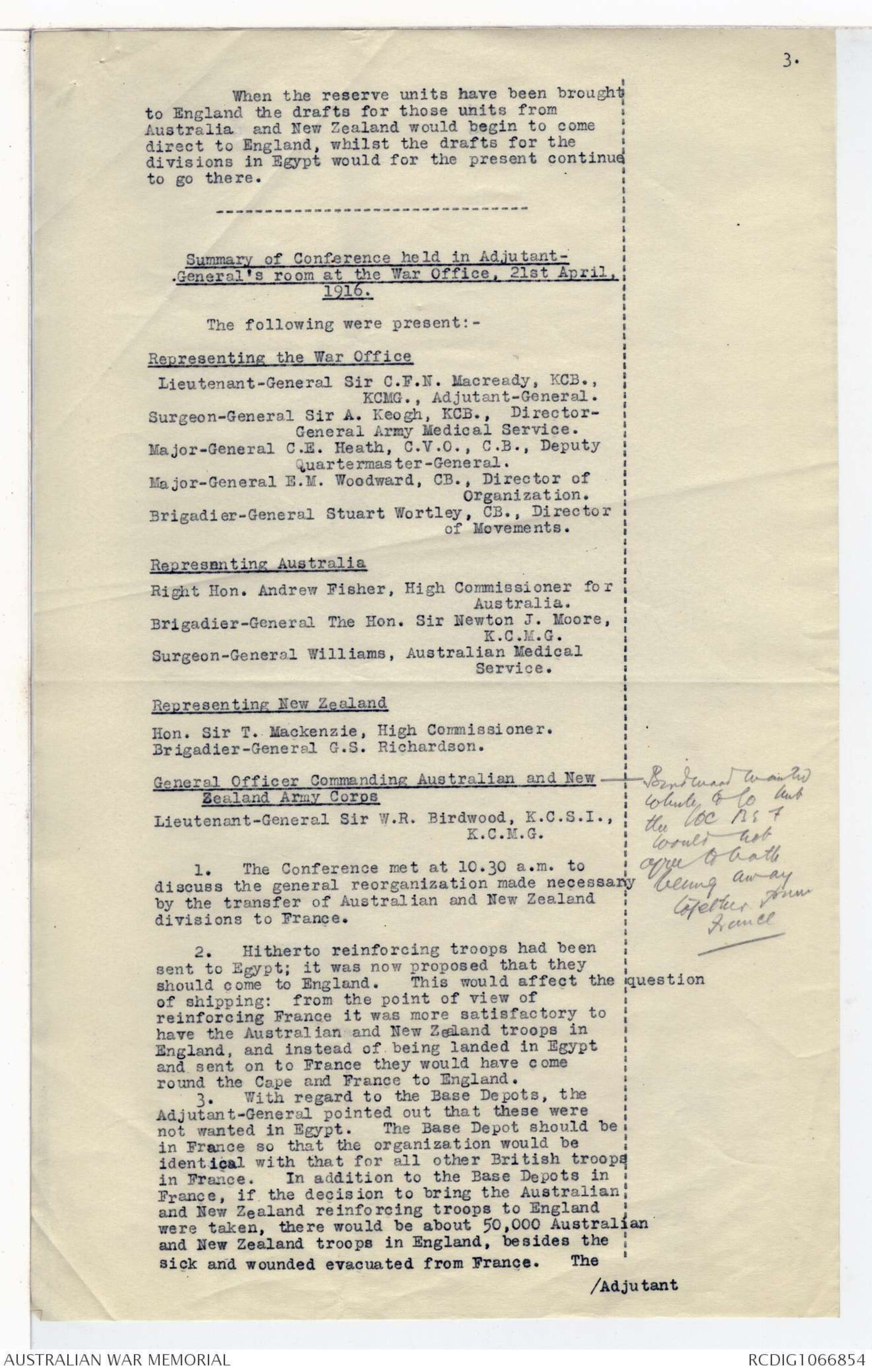
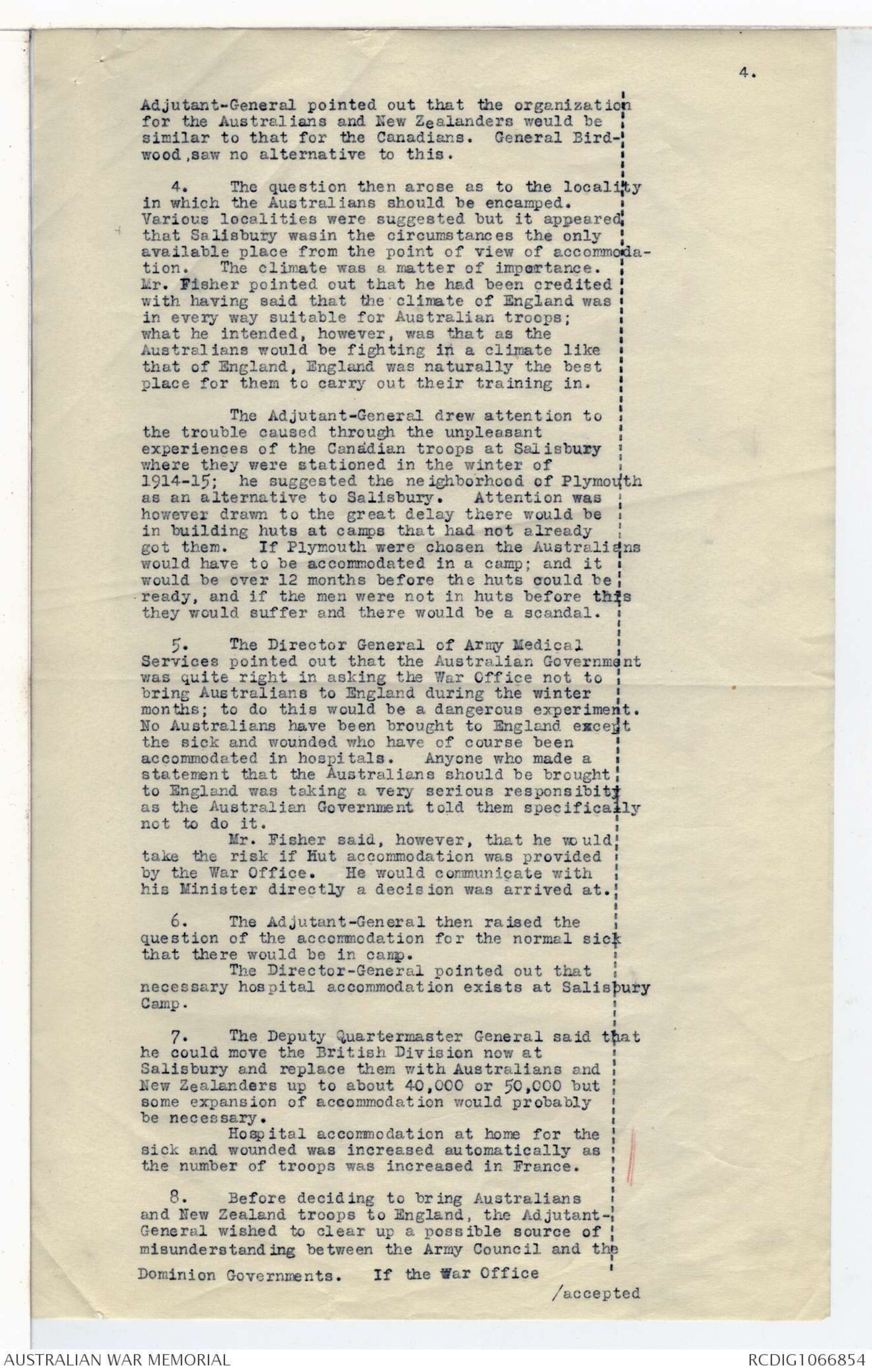
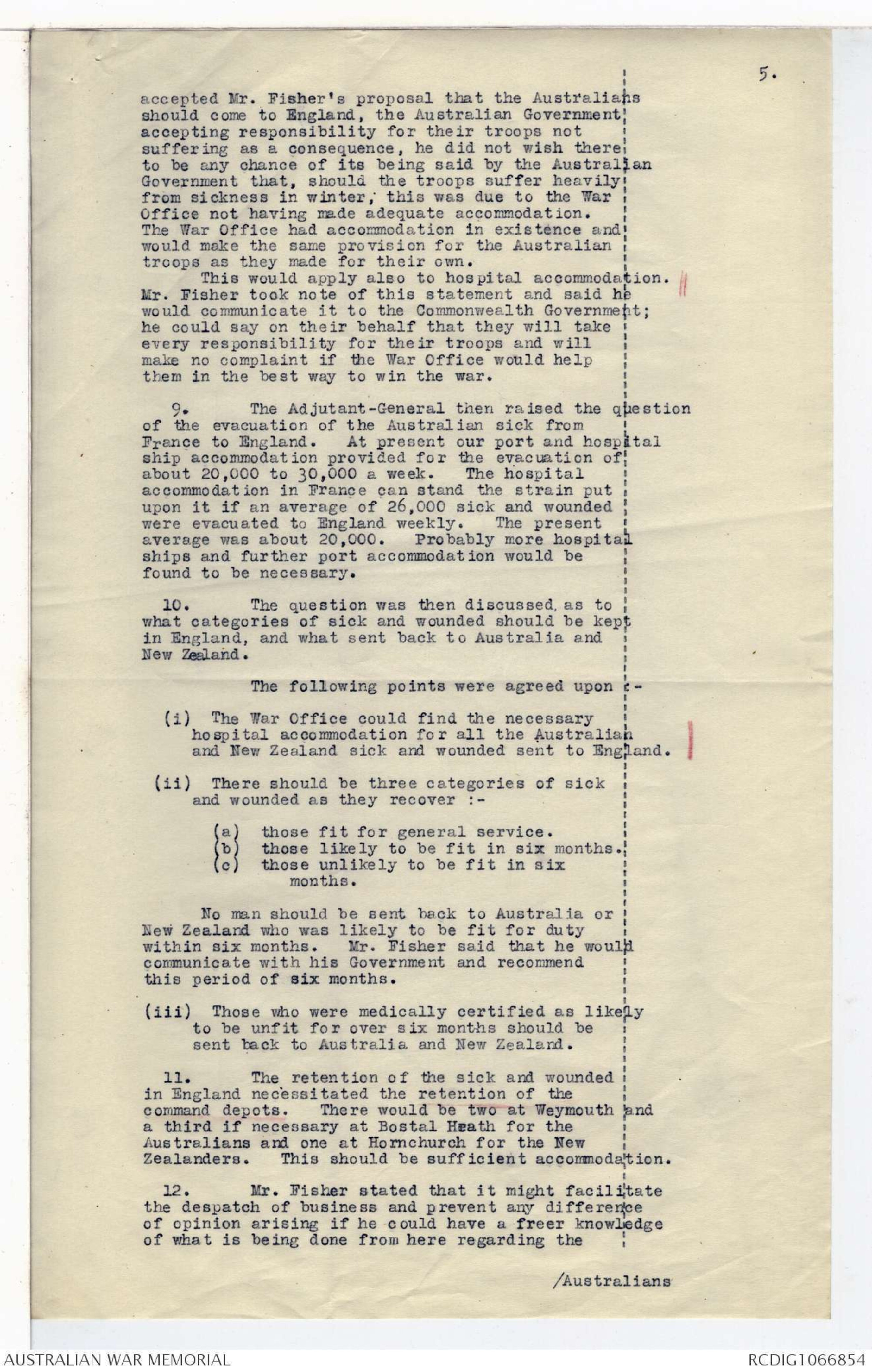
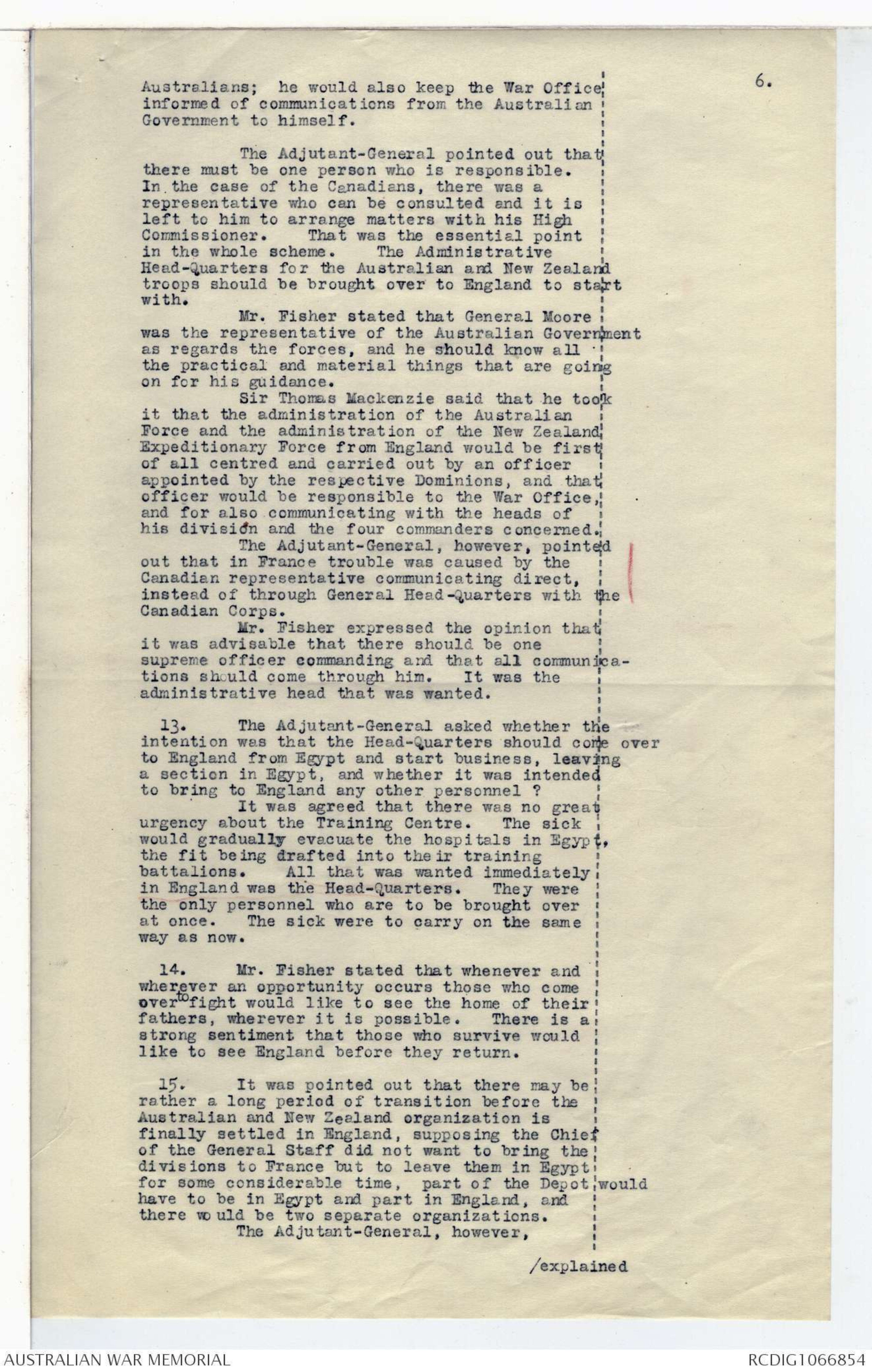
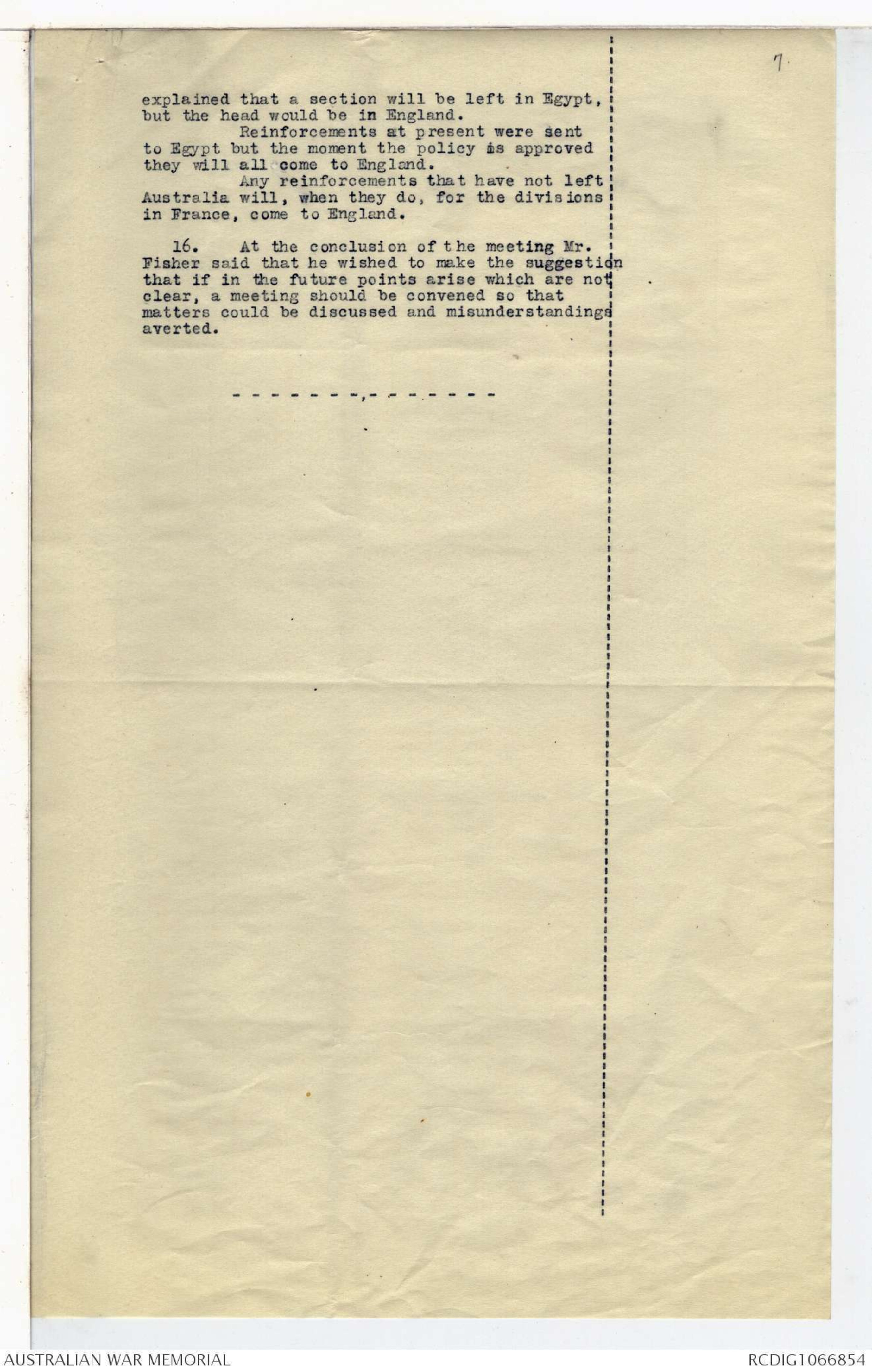
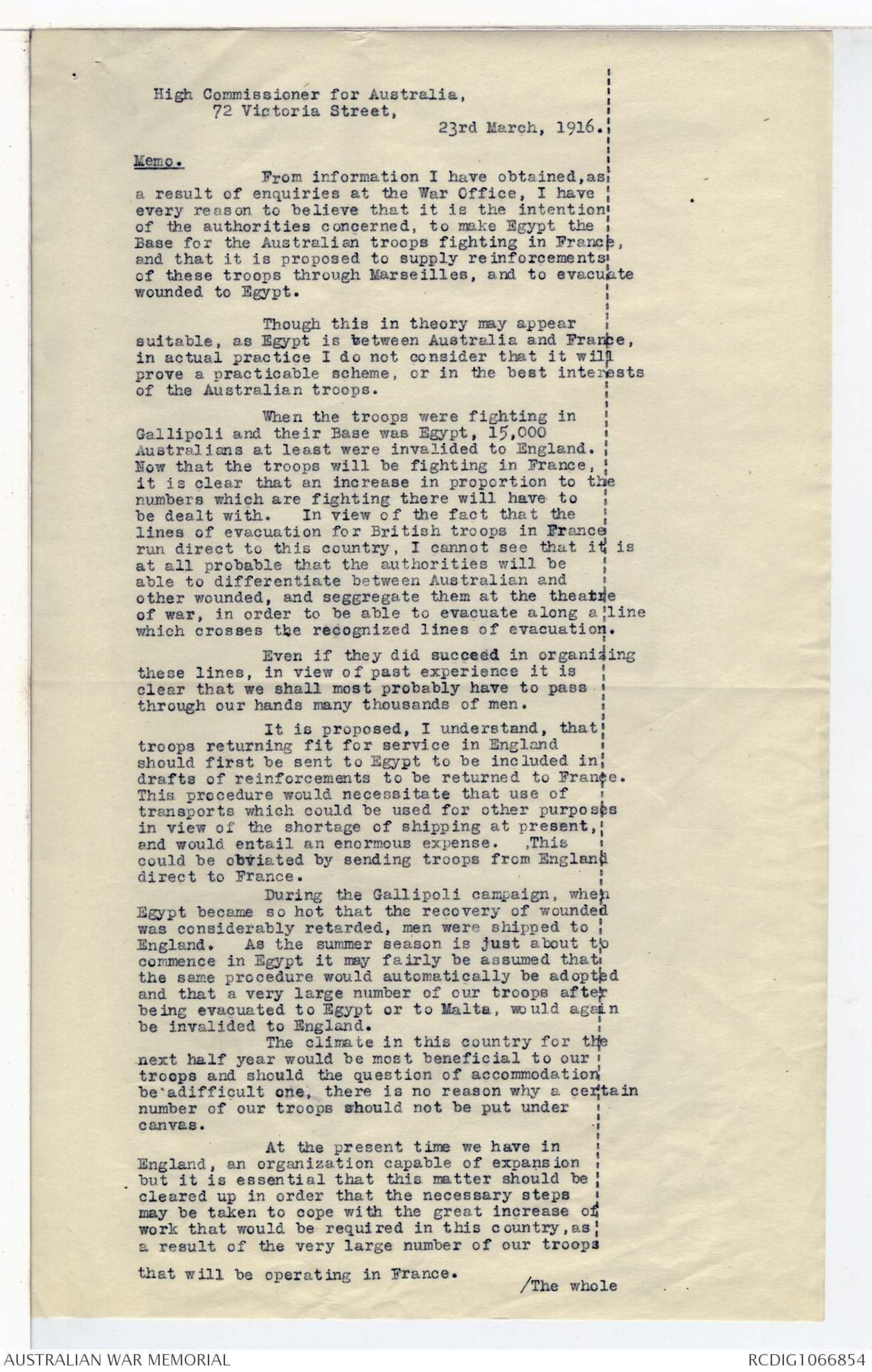
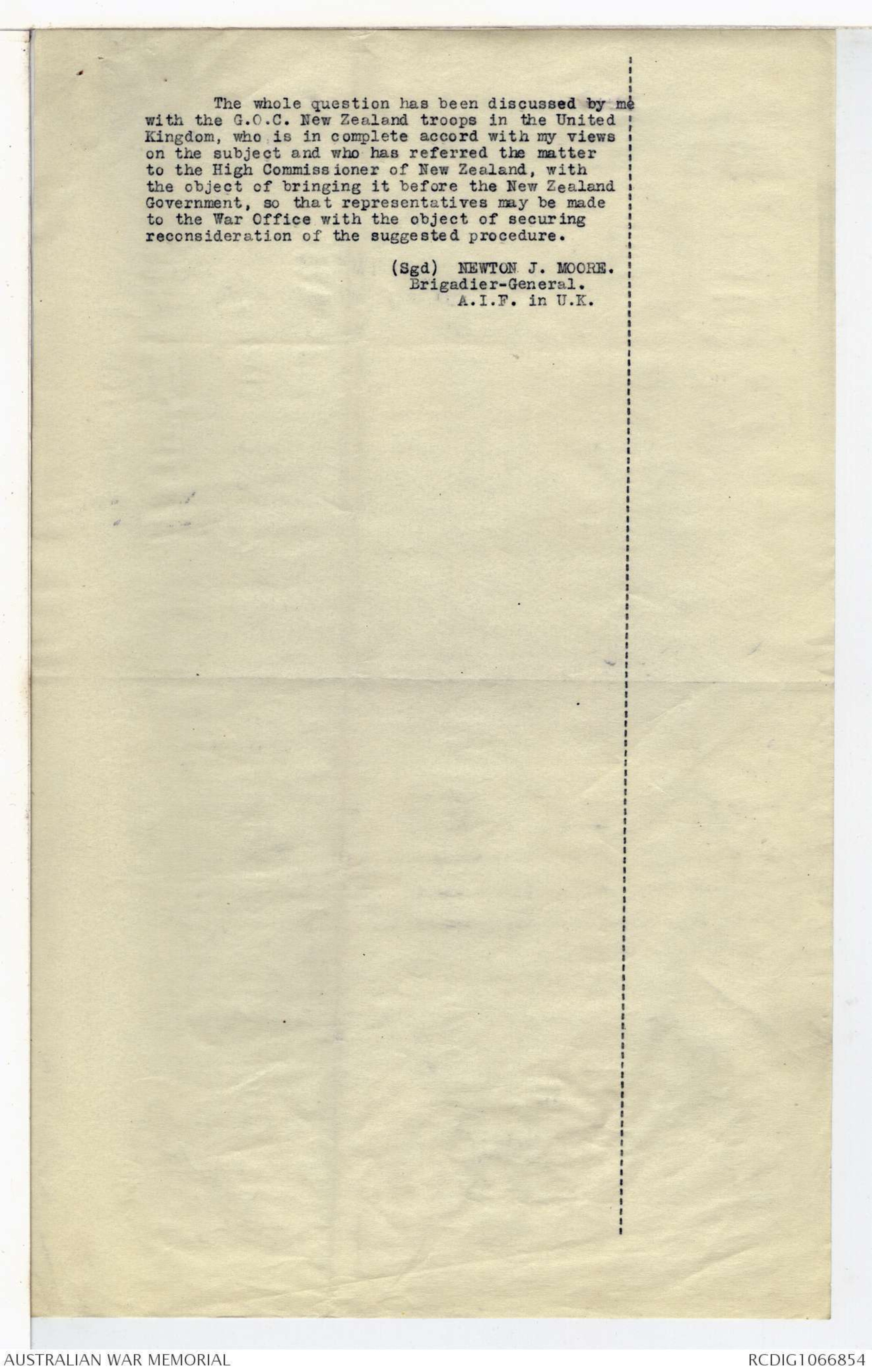
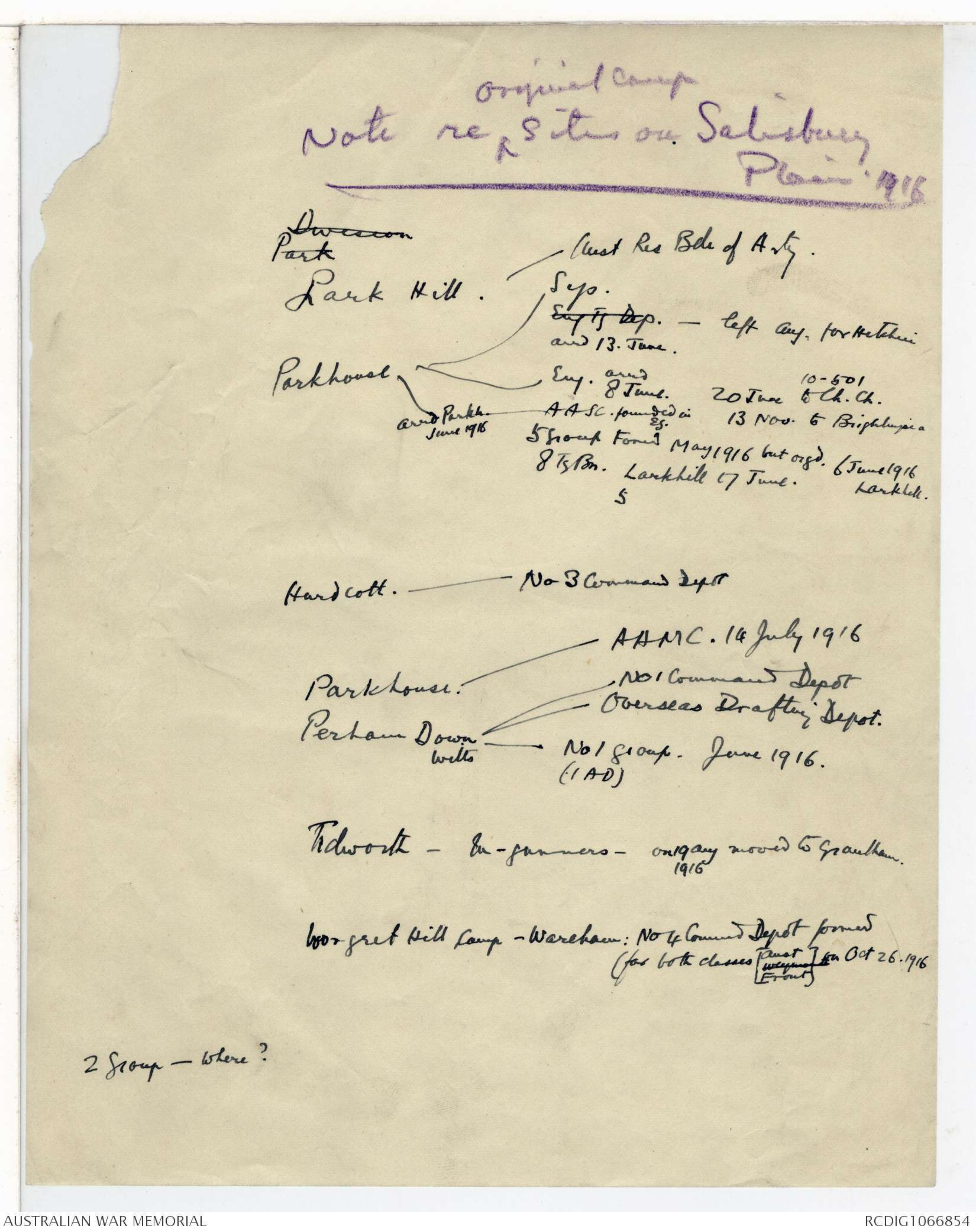
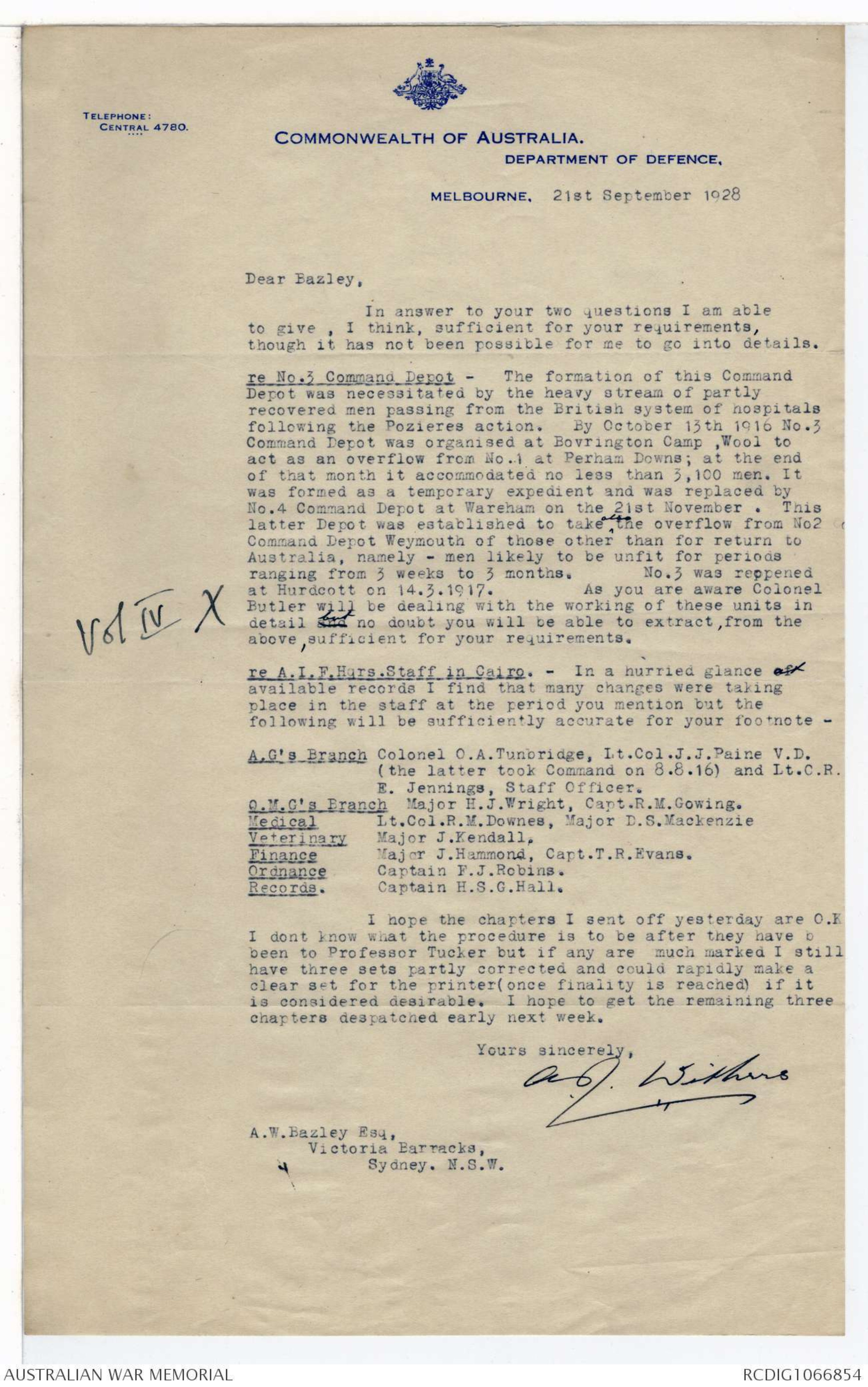
No. 121/0verseas/1936.
Further Conference on 28th April, 1916,
D.C.I.G.S. in the Chair in the absence
of the A.G.
--------
The general principle of the proposals
laid down in the Summary of Conference on 21st April,
1916, were approved, and the various paragraphs
were gone over.
Reference para. 10.
No reply has been received from the
Commonwealth Government as to men being retained
in this country who are likely to be fit within
6 months, instead of three months which that Govern-
ment previously wanted.
Reference para.10.
The depots now at Weymouth, Bostal and
Hornchurch are not at present command depots,
but would be adapted for that purpose when the
reserves are moved to the Training Centre shortly
to be established in England.
Reference para. 12.
It was decided that there should be a
Military representative in this country for
the Australian troops and another for the New
Zealand troops with whom the War Office would
deal direct.
The representative in each case would establish
a Head-Quarters in London where the administrative
work would be carried out, and would have under him
a responsible training staff at the camps
allotted to the reserve units.
Brigadier-General Sir Newton Moore
and Brigadier-General Richardson are at present
these representatives. General Birdwood
stated he was sure that the respective Governments
would prefer to retain these officers or appoint
others themselves rather than have Imperial
officers, but he believed they would be grateful
for the assistance of an administrative staff
officer at the Australian Head-Quarters in
London, and one or two general staff officers
to assist at the Training Centres.
D.G.I.G.S. said the War Office would give
every assistance in this respect.
The High Commissioner would be kept
informed by the Military Representatives of all
that was going on.
Copies of letters and instructions
sent direct to the Military Representatives by
the War Office would be forwarded at the same
time to the Command in which the training
centres are located.
Reference para. 13.
It was decided that the Intermediate
Administrative Head-Quarters of both Australian
and New Zealand Contingents should be brought
to England from Egypt at once. A section of
the former being left in Egypt to deal with the
4th and 5th Divisions so long as they remain
in that country.
The reserve units for the Divisions
now in France would be brought to England as
soon as the administrative head-quarters are established
here and the camps and training staff
in readiness.
/When
3.
When the reserve units have been brought
to England the drafts for those units from
Australia and New Zealand would begin to come
direct to England, whilst the drafts for the
divisions in Egypt would for the present continue
to go there.
-------------
Summary of Conference held in Adjutant-
General s room at the War Office, 21st April.
1916.
The following were present:
Representing the War Office
Lieutenant-General Sir C.F.N. Macready, KCB.,
KCMG., Adjutant-General.
Surgeon-General Sir A. Keogh, KCB., Director.
General Army Medical Service.
Major-General C.E. Heath, C.V.O., C.B., Deputy
Quartermaster-General.
Major-General E.M. Woodward, CB., Director of
Organization.
Brigadier-General Stuart Wortley, CB., Director
of Movements.
Representing Australia
Right Hon. Andrew Fisher, High Commissioner for
Australia.
Brigadier-General The Hon. Sir Newton J. Moore,
K.C.M.G.
Surgeon-General Williams, Australian Medical
Service.
Representing New Zealand
Hon. Sir T. Mackenzie, High Commissioner.
Brigadier-General G.S. Richardson.
Bendenadd toantid
General Officer Commanding Australian and New
Zealand Army Corps
Lieutenant-General Sir W.R. Birdwood, K.C.S.I.,
K.C.M.G.
1. The Conference met at 10.30 a.m. to
discuss the general reorganization made necessany
by the transfer of Australian and New Zealand
divisions to France.
2. Hitherto reinforcing troops had been
sent to Egypt; it was now proposed that they
should come to England. This would affect the question
of shipping: from the point of view of
reinforcing France it was more satisfactory to
have the Australian and New Zeland troops in
England, and instead of being landed in Egypt
and sent on to France they would have come
round the Cape and France to England.
3. With regard to the Base Depots, the
Adjutant-General pointed out that these were
not wanted in Egypt. The Base Depot should be
in France so that the organization would be
identical with that for all other British troops
in France. In addition to the Base Depots in
France, if the decision to bring the Australian!
and New Zealand reinforcing troops to England
were taken, there would be about 50,000 Australian
and New Zealand troops in England, besides the
sick and wounded evacuated from France. The
/Adjutant
[-Birdwood wanted
White to [?] [?]
the loc [?] [?] [?]
would not
agree to both
being away
together from
France*]
4.
Adjutant-General pointed out that the organization
for the Australians and New Zealanders would be
similar to that for the Canadians. General Birdwood,
saw no alternative to this.
4. The question then arose as to the locality
in which the Australians should be encamped.
Various localities were suggested but it appeared.
that Salisbury wasin the circumstances the only
available place from the point of view of accommodation.
The climate was a matter of importance.
Mr. Fisher pointed out that he had been credited
with having said that the climate of England was
in every way suitable for Australian troops;
what he intended, however, was that as the
Australians would be fighting in a climate like
that of England, England was naturally the best
place for them to carry out their training in.
The Adjutant-General drew attention to
the trouble caused through the unpleasant
experiences of the Canadian troops at Salisbury
where they were stationed in the winter of
1914-15; he suggested the neighborhood of Plymouth
as an alternative to Salisbury. Attention was
however drawn to the great delay there would be:
in building huts at camps that had not already
got them. If Plymouth were chosen the Australians
would have to be accommodated in a camp; and it
would be over 12 months before the huts could be
ready, and if the men were not in huts before this
they would suffer and there would be a scandal.
5. The Director General of Army Medical
Services pointed out that the Australian Government
was quite right in asking the War Office not to
bring Australians to England during the winter
months; to do this would be a dangerous experiment.
No Australians have been brought to England except
the sick and wounded who have of course been
accommodated in hospitals. Anyone who made a
statement that the Australians should be brought
to England was taking a very serious responsibility
as the Australian Government told them specifically
not to do it.
Mr. Fisher said, however, that he would
take the risk if Hut accommodation was provided
by the War Office. He would communicate with
his Minister directly a decision was arrived at.
6. The Adjutant-General then raised the
question of the accommodation for the normal sick
that there would be in camp.
The Director-General pointed out that
necessary hospital accommodation exists at Salisbury
Camp.
7. The Deputy Quartermaster General said that
he could move the British Division now at
Salisbury and replace them with Australians and
New Zealanders up to about 40,000 or 50,000 but
some expansion of accommodation would probably
be necessary.
Hospital accommodation at home for the
sick and wounded was increased automatically as
the number of troops was increased in France.
8. Before deciding to bring Australians
and New Zealand troops to England, the Adjutant-
General wished to clear up a possible source of
misunderstanding between the Army Council and the
Dominion Governments. If the War Office
/accepted
5.
accepted Mr. Fisher's proposal that the Australians
should come to England, the Australian Government
accepting responsibility for their troops not
suffering as a consequence, he did not wish there
to be any chance of its being said by the Australian
Government that, should the troops suffer heavily
from sickness in winter, this was due to the War
Office not having made adequate accommodation.
The War Office had accommodation in existence and
would make the same provision for the Australian
troops as they made for their own.
This would apply also to hospital accommodation.
Mr. Fisher took note of this statement and said he
would communicate it to the Commonwealth Government;
he could say on their behalf that they will take
every responsibility for their troops and will
make no complaint if the War Office would help
them in the best way to win the war.
9. The Adjutant-General then raised the question
of the evacuation of the Australian sick from
France to England. At present our port and hospital
ship accommodation provided for the evacuation of
about 20,000 to 30,000 a week. The hospital
accommodation in France can stand the strain put
upon it if an average of 26,000 sick and wounded
were evacuated to England weekly. The present
average was about 20,000. Probably more hospital
ships and further port accommodation would be
found to be necessary.
10. The question was then discussed as to
what categories of sick and wounded should be kept
in England, and what sent back to Australia and
New Zealand.
The following points were agreed upon
(i) The War Office could find the necessary
hospital accommodation for all the Australian
and New Zealand sick and wounded sent to England.
(ii) There should be three categories of sick
and wounded as they recover :-
(a) those fit for general service.
(b) those likely to be fit in six months.
(c) those unlikely to be fit in six
months.
No man should be sent back to Australia or
New Zealand who was likely to be fit for duty
within six months. Mr. Fisher said that he would
communicate with his Government and recommend
this period of six months.
(iii) Those who were medically certified as likely
to be unfit for over six months should be
sent back to Australia and New Zealand.
11. The retention of the sick and wounded
in England necessitated the retention of the
command depots. There would be two at Weymouth and
a third if necessary at Bostal Heath for the
Australians and one at Hornchurch for the New
Zealanders. This should be sufficient accommodation.
12. Mr. Fisher stated that it might facilitate
the despatch of business and prevent any difference
of opinion arising if he could have a freer knowledge
of what is being done from here regarding the
/Australians
6.
Australians; he would also keep the War Office
informed of communications from the Australian
Government to himself.
The Adjutant-Ceneral pointed out that
there must be one person who is responsible.
In the case of the Canadians, there was a
representative who can be consulted and it is
left to him to arrange matters with his High
Commissioner. That was the essential point
in the whole scheme. The Administrative
Head-Quarters for the Australian and New Zealand
troops should be brought over to England to start
with.
Mr. Fisher stated that General Moore
was the representative of the Australian Government
as regards the forces, and he should know all
the practical and material things that are going
on for his guidance.
Sir Thomas Mackenzie said that he took
it that the administration of the Australian
Force and the administration of the New Zealand
Expeditionary Force from England would be first
of all centred and carried out by an officer
appointed by the respective Dominions, and that
officer would be responsible to the War Office,
and for also communicating with the heads of
his divisidn and the four commanders concerned.
The Adjutant-General, however, pointed
out that in France trouble was caused by the
Canadian representative communicating direct,
instead of through General Head-Quarters with
the Canadian Corps.
Mr. Fisher expressed the opinion that
it was advisable that there should be one
supreme officer commanding and that all communications
should come through him. It was the
administrative head that was wanted.
13. The Adjutant-General asked whether the
intention was that the Head-Quarters should come over
to England from Egypt and start business, leaving
a section in Egypt, and whether it was intended
to bring to England any other personnel ?
It was agreed that there was no great
urgency about the Training Centre. The sick
would gradually evacuate the hospitals in Egypt.
the fit being drafted into their training
battalions. All that was wanted immediately.
in England was the Head-Quarters. They were
the only personnel who are to be brought over
at once. The sick were to carry on the same
way as now.
14. Mr. Fisher stated that whenever and
wherever an opportunity occurs those who come
overtofight would like to see the home of their
fathers, wherever it is possible. There is a:
strong sentiment that those who survive would,
like to see England before they return.
15. It was pointed out that there may be!
rather a long period of transition before the
Australian and New Zealand organization is
finally settled in England, supposing the Chief
of the General Staff did not want to bring the
divisions to France but to leave them in Egypt:
for some considerable time, part of the Depot would
have to be in Egypt and part in England, and
there would be two separate organizations.
The Adjutant-General, however,
/explained
7.
explained that a section will be left in Egypt,
but the head would be in England.
Reinforcements at present were sent
to Egypt but the moment the policy is approved
they will all come to England.
Any reinforcements that have not left
Australia will, when they do, for the divisions'
in France, come to England.
16. At the conclusion of the meeting Mr.
Fisher said that he wished to make the suggestion
that if in the future points arise which are not
clear, a meeting should be convened so that
matters could be discussed and misunderstandings
averted.
- - - - - - - - - , - - - - - - - - -
High Commissioner for Australia,
72 Victoria Street,
23rd March, 1916.
Memo.
From information I have obtained,as:
a result of enquiries at the War Office, I have
every reason to believe that it is the intention;
of the authorities concerned, to make Egypt the!
Base for the Australian troops fighting in France,
and that it is proposed to supply reinforcements
of these troops through Marseilles, and to evacuate
wounded to Egypt.
Though this in theory may appear
suitable, as Egypt is between Australia and France,
in actual practice I do not consider that it will
prove a practicable scheme, or in the best interests
of the Australian troops.
When the troops were fighting in
Gallipoli and their Base was Egypt, 15,000
Australians at least were invalided to England.
Now that the troops will be fighting in France,
it is clear that an increase in proportion to the
numbers which are fighting there will have to
be dealt with. In view of the fact that the
lines of evacuation for British troops in France
run direct to this country, I cannot see that it is
at all probable that the authorities will be
able to differentiate between Australian and
other wounded, and seggregate them at the theatre
of war, in order to be able to evacuate along a line
which crosses the recognized lines of evacuation.
Even if they did succeed in organising
these lines, in view of past experience it is
clear that we shall most probably have to pass.
through our hands many thousands of men.
It is proposed, I understand, that
troops returning fit for service in England
should first be sent to Egypt to be included in
drafts of reinforcements to be returned to France.
This procedure would necessitate that use of
transports which could be used for other purposes
in view of the shortage of shipping at present,
and would entail an enormous expense. This
could be obviated by sending troops from England
direct to France.
During the Gallipoli campaign, when
Egypt became so hot that the recovery of wounded
was considerably retarded, men were shipped to
England. As the summer season is just about to
commence in Egypt it may fairly be assumed that
the same procedure would automatically be adopted
and that a very large number of our troops after
being evacuated to Egypt or to Malta, would again
be invalided to England.
The climate in this country for the
next half year would be most beneficial to our
troops and should the question of accommodation
be'adifficult one, there is no reason why a certain
number of our troops should not be put under
canvas.
At the present time we have in
England, an organization capable of expansion
but it is essential that this matter should be
cleared up in order that the necessary steps
may be taken to cope with the great increase of
work that would be required in this country, as;
a result of the very large number of our troops
that will be operating in France.
/The whole
The whole question has been discussed by me
with the G.O.C. New Zealand troops in the United
Kingdom, who is in complete accord with my views
on the subject and who has referred the matter
to the High Commissioner of New Zealand, with
the object of bringing it before the New Zealand
Government, so that representatives may be made
to the War Office with the object of securing
reconsideration of the suggested procedure.
(Sgd) NEWTON J. MOORE.
Brigadier-General.
A.I.F. in U.K.
Note re Original Camp Sites on Salisbury
Plain 1918
Division
Park
Park Hill — Aust Res Bde of Arty
Parkhouse — Sys.
Eng Tg Dep. — left Aug. form Hetchine
arv 13. June.
— E[?]. arr 8 June 20 June to 10-501 Ch. Ch.
— arrd Parkh.—AASC. forwarded in eg. 13 Nov. to Brightlingsea
5 Group Formd May 1916 but orig. 6 June 1916
8 Tg Bn. Larkhill 17 June.
5
Hurdcott. — No 3 Command Dept
Parkhouse — AAMC. 14 July 1916
Perham Down — No 1 Command Dept
— Overseas Drafting Dept.
— No 1 Group. June 1916.
(1 AD)
Wells
Tidworth — [?} - gunners - on 19 Aug moved to Graulham.
1916
Worget Hill Camp — Warehouse: No 4 Command Dept formed
(for both classes [Aust ] on Oct 23. 1916
[Warehouse]
[Front ]
2 Group - Where?
TELEPHONE
CENTRAL 4780.e
COMMONWEALTH OF AUSTRALIA.
DEPARTMENT OF DEFENCE,
MELBOURNE. 21st September 1928
Dear Bazley,
In answer to your two questions I am able
to give , I think, sufficient for your requirements,
though it has not been possible for me to go into details.
re No.3 Command Depot - The formation of this Command
Depot was necessitated by the heavy stream of partly
recovered men passing from the British system of hospitals
following the Pozieres action. By October 13th 1916 No.3
Command Depot was organised at Bovrington Camp ,Wool to
act as an overflow from No.1 at Perham Downs; at the end
of that month it accommodated no less than 3,100 men. It
was formed as a temporary expedient and was replaced by
No.4 Command Depot at Wareham on the 21st November. This
latter Depot was established to take also the overflow from No2
Command Depot Weymouth of those other than for return to
Australia, namely - men likely to be unfit for periods
ranging from 3 weeks to 3 months. No.3 was reopened
at Hurdcott on 14.3.1917. As you are aware Colonel
Butler will be dealing with the working of these units in
detail and but no doubt you will be able to extract ,from the
above ,sufficient for your requirements.
[*Vol IV X*]
re A.I.F.Hqrs.Staff in Cairo. - In a hurried glance ofx
available records I find that many changes were taking
place in the staff at the period you mention but the
following will be sufficiently accurate for your footnote -
A.G's Branch Colonel O.A.Tunbridge, Lt.Col.J.J.Paine V.D.
(the latter took Command on 8.8.16) and Lt.C.R.
E. Jennings, Staff Officer.
O.M.G's Branch Major H.J.Wright, Capt.R.M.Gowing.
Medical Lt.Col.R.M.Downes, Major D.S.Mackenzie
Veterinary Major J.Kendall,
Finance Major J.Hammond, Capt.T.R.Evans.
Ordnance Captain F.J.Robins.
Records. Captain H.S.G.Hall.
I hope the chapters I sent off yesterday are O.K
I dont know what the procedure is to be after they have b
been to Professor Tucker but if any are, much marked I still
have three sets partly corrected and could raridly make a
clear set for the printer(once finality is reached) if it
is considered desirable. I hope to get the remaining three
chapters despatched early next week.
Yours sincerely,
A.J. Withers
A.W. Bazley Esq,
Victoria Barracks
Sydney. N.S.W.
 Sam scott
Sam scottThis transcription item is now locked to you for editing. To release the lock either Save your changes or Cancel.
This lock will be automatically released after 60 minutes of inactivity.